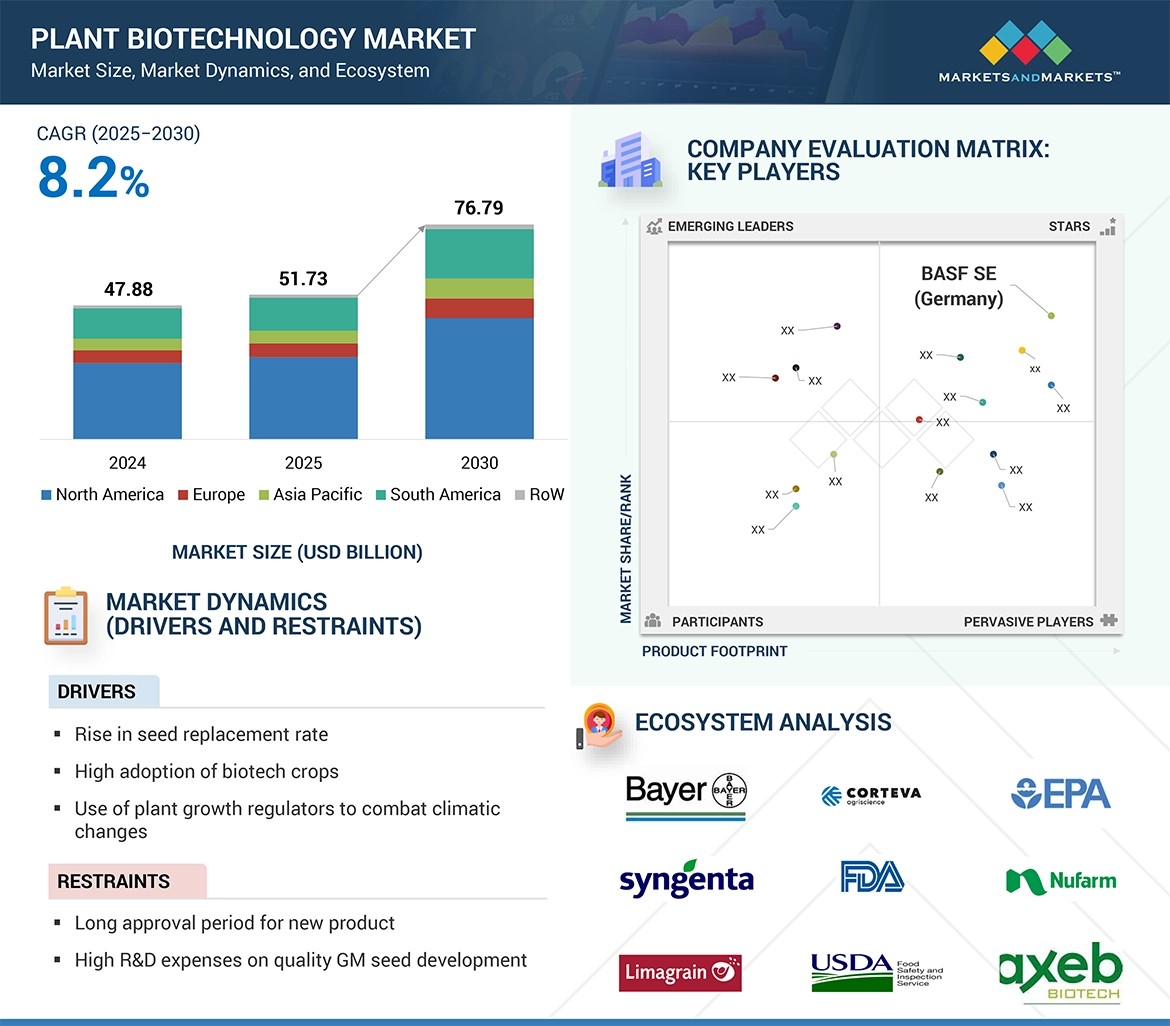
The plant biotechnology market is experiencing remarkable growth as the world increasingly looks toward sustainable agricultural solutions and innovative biotechnologies to address food security, environmental challenges, and evolving consumer demands. Valued at several billion dollars, the market is poised for steady expansion over the coming years, driven by cutting-edge research, regulatory support, and rising adoption of genetically modified (GM) crops, advanced breeding techniques, and bio-based agricultural inputs.
The plant biotechnology market is estimated at USD 51.73 billion in 2025 and is projected to reach USD 76.79 billion by 2030, at a CAGR of 8.2% from 2025 to 2030.

Plant Biotechnology Market Drivers
- Rising Global Food Demand: With the global population projected to surpass 9 billion by 2050, the demand for higher crop yields and improved food security is at an all-time high. Plant biotechnology plays a critical role in enhancing crop productivity, improving resistance to pests and diseases, and increasing tolerance to environmental stresses like drought and salinity.
- Sustainable Agriculture: The focus on reducing chemical inputs such as synthetic fertilizers and pesticides has propelled the adoption of biotech crops and biological solutions. Genetically engineered plants and biostimulants help lower the environmental footprint of farming, contributing to more sustainable agricultural practices.
- Technological Advancements: Innovations such as CRISPR-Cas9 gene editing, RNA interference (RNAi), molecular markers, and advanced tissue culture techniques are driving the next wave of growth in plant biotechnology. These tools enable precise genetic improvements and accelerate the development of superior plant varieties.
- Regulatory Support and Consumer Awareness: Increasing acceptance of biotech crops in many regions, coupled with supportive regulatory frameworks, is fostering market expansion. Additionally, growing consumer awareness about the benefits of bioengineered crops, including improved nutritional profiles, is positively influencing demand.
Market Segments and Applications
- Genetically Modified (GM) Crops: GM crops continue to dominate the market, with traits such as herbicide tolerance, insect resistance, and enhanced nutritional content.
- Biopesticides and Biofertilizers: These bio-based products are gaining traction as eco-friendly alternatives to traditional agrochemicals, enhancing soil health and crop resilience.
- Genomics and Molecular Breeding: These technologies aid in accelerating breeding programs and developing new plant varieties with desirable traits.
- Precision Agriculture: Integrated with biotech solutions, precision farming optimizes resource use and boosts productivity.
Emerging Trends in the Plant Biotechnology Market
- Biofortification: Enhancing the nutritional content of staple crops to address micronutrient deficiencies.
- Molecular Farming: Using plants as biofactories to produce pharmaceuticals, vaccines, and industrial enzymes.
- Digital Agriculture: Integration of biotech solutions with data-driven precision agriculture to optimize crop management.
Plant Biotechnology Market Regional Insights
- North America and Europe are key markets due to strong R&D infrastructure and early adoption of biotech innovations.
- Asia-Pacific is emerging as a high-growth region, supported by increasing investments in agricultural biotechnology, a large agrarian population, and pressing food security needs.
Download PDF Brochure: https://www.marketsandmarkets.com/pdfdownloadNew.asp?id=225105561
Future Outlook
As climate change, resource constraints, and the need for food security continue to challenge the global agricultural landscape, plant biotechnology will play a pivotal role in shaping the future of farming. Collaborations between public institutions, private companies, and governments are expected to further fuel market growth and innovation.
Emerging trends such as personalized nutrition, plant-based proteins, and regenerative agriculture will also create new opportunities for plant biotechnology applications.
Leading Plant Biotechnology Companies
The report profiles key players such as BASF SE (Germany), Bayer AG (Germany), Corteva Agroscience (US), Syngenta AG (Switzerland), FMC Corporation (US), UPL (India), Sumitomo Chemical Co. Ltd. (Japan), Nufarm (Australia), KWS SAAT SE & Co. KGAA (Germany), Pro Farm Group (US), Limagrain (France), STK Bio AG Technologies (Israel), Vestaron Corporation (US), Certis USA LLC (US), and DLF Seeds (Denmark).

